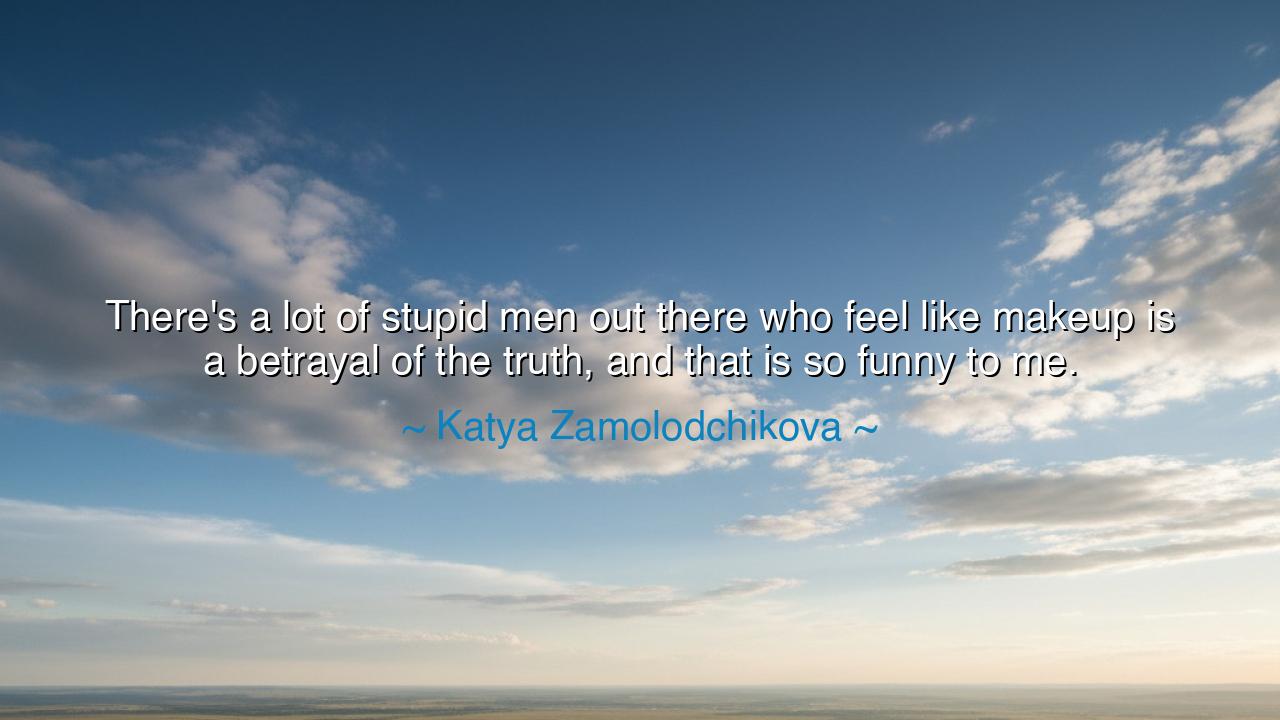
There's a lot of stupid men out there who feel like makeup is a
There's a lot of stupid men out there who feel like makeup is a betrayal of the truth, and that is so funny to me.






When Katya Zamolodchikova declared, “There’s a lot of stupid men out there who feel like makeup is a betrayal of the truth, and that is so funny to me,” she spoke not only as an artist of transformation, but as a philosopher of appearance — one who understands that truth and illusion are not enemies, but dance partners in the theater of existence. Her words slice through the ignorance of those who mistake surface for deceit, and remind us that artifice can be honesty, that beauty, when consciously created, reveals rather than conceals. Beneath the humor and flamboyance of her statement lies a teaching as old as civilization: that the human being is not bound to one face, one self, or one “truth,” but is instead a living canvas upon which the spirit paints its own freedom.
The origin of this quote lies in Katya’s world — the world of drag, of performance, of deliberate transformation. Drag, far from being mere decoration, is a modern form of ancient ritual — a ceremony of becoming. To adorn the face with paint, to clothe the body in extravagance, is not to hide from truth but to express a deeper truth: that identity is fluid, theatrical, and radiant in its impermanence. The “stupid men” of her saying are not fools by birth, but by choice — they cling to the illusion that authenticity means staying untouched, unadorned, untransformed. Yet the ancients knew otherwise. From the painted warriors of the Celts to the powdered sages of the East, humanity has always used adornment to bridge the human and the divine.
Consider the rituals of the ancient Egyptians, who wore cosmetics not for vanity but for protection and power. Their black kohl was both shield and symbol — a reflection of the soul’s readiness to face the gods. Or think of the Greek actors, whose masks in the theater did not conceal but magnified emotion, allowing the gods to speak through mortal voices. These, too, were forms of “makeup.” The ancients knew that truth often hides beneath performance, and that only through transformation can one glimpse eternity. What Katya reminds us, with humor and bite, is that to fear artifice is to fear one’s own potential — to deny the freedom to become something more than what one was born as.
Her laughter at the accusation of “betrayal” is the laughter of the enlightened. For what could be more absurd than the belief that one’s natural state is the only truthful one? A face without paint is no more honest than a face adorned, for both are choices. Every human being performs — in how they dress, how they speak, how they wish to be seen. The difference lies not in the act, but in the awareness of it. Those who scorn makeup mistake ignorance for purity; those who embrace it understand that truth is not static, but sculpted. To create one’s image consciously is not to deceive, but to declare: I am the author of my own form.
There is a powerful freedom in this understanding. The philosopher Plato wrote of shadows and light in his allegory of the cave — warning that many mistake shadows for truth. But perhaps, as Katya might say, there is truth even in the shadow, if one knows how to wield it. Makeup, then, becomes a metaphor not just for artistry, but for self-mastery. It is the act of reclaiming one’s reflection, saying: “This is not who I pretend to be. This is who I choose to be.” The divine irony is that in embracing artifice, one may discover a purer kind of honesty — the kind born not of nature, but of intention.
The story of transformation is written across history. When Cleopatra entered the halls of Rome, veiled in gold dust and scent, her beauty was not deception — it was power embodied. She understood, as Katya does, that perception shapes reality, and that to command the image is to command the world. The same lesson belongs to the shamans, who painted their faces before calling the spirits, and to the poets, who painted their words before speaking truth. The face we show to the world is a spell — and the wise do not fear the spellcaster.
So, dear listener, take this as your lesson: do not let others shame you for your adornment, your performance, or your transformation. Whether you paint your face, shape your words, or forge your destiny in color and light, do it with awareness and joy. The fool demands “authenticity” while living behind masks of his own making; the wise artist wears hers proudly and calls it art. The universe itself is adorned — stars scattered across the heavens, oceans dressed in moonlight, mountains crowned with snow. Are we not reflections of that divine artistry?
Thus, the teaching of Katya Zamolodchikova endures: to laugh at those who call beauty deceit, and to live as one who knows that truth wears many faces. Life itself is a performance — sacred, fleeting, and infinite in its forms. So paint your face, adorn your spirit, and step boldly into your chosen light. For the act of creation is never betrayal — it is, and always has been, the highest expression of truth.






AAdministratorAdministrator
Welcome, honored guests. Please leave a comment, we will respond soon